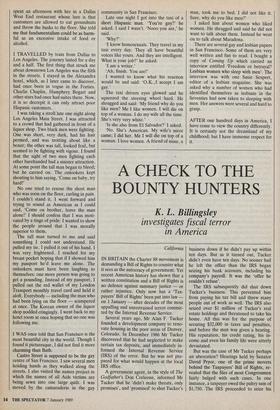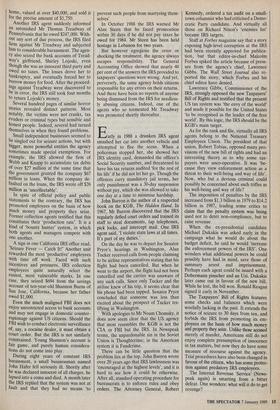A CHECK TO THE BOUNTY HUNTERS
K. L. Billingsley investigates fiscal terror in America
California IN BRITAIN the Charter 88 movement is demanding a Bill of Rights to counter what it sees as the autocracy of government. Yet recent American history has shown that a written constitution and a Bill of Rights is no defence against summary justice — or rather injustice. Only now has a `Tax- payers' Bill of Rights' been put into law on 1 January — after decades of the most appalling and unrestrained terror commit- ted by the Internal Revenue Service.
Several years ago, Mr Alan F. Tucker founded a development company to reno- vate housing in the poor areas of Denver, Colorado. In December 1986 Mr Tucker discovered that he had neglected to make certain tax deposits, and immediately in- formed the Internal Revenue Service (IRS) of the error. But he was not pre- pared for what would happen at the local IRS office.
A government agent, in the style of The Godfather's Don Corleone, informed Mr Tucker that he `didn't make threats, only promises', and `promised' to shut Tucker's business down if he didn't pay up within ten days. But as it turned out, Tucker didn't even have ten days. No sooner had he left the office than the IRS began seizing his bank accounts, including his company's payroll. It was the 'offer he couldn't refuse'.
The IRS subsequently did shut down Tucker's business. This prevented him from paying his tax bill and threw many people out of work as well. The IRS also seized over $1 million of Tucker's real estate holdings and threatened to take his home. All this was for the purpose of securing $32,000 in taxes and penalties, and before the man was given a hearing. His reputation, his credit rating, his in- come and even his family life were utterly devastated.
But was the case of Mr Tucker perhaps an aberration? Hearings held by Senator David Pryor, one of the prime movers behind the Taxpayers' Bill of Rights, re- vealed that the files of most Congressmen fairly bulged with such cases. In one instance, a taxpayer owed the paltry sum of $1,750. The IRS proceeded to seize his home, valued at over $40,000, and sold it for the precise amount of $1,750.
Another IRS agent suddenly informed an astonished Mr Thomas Treadway of Pennsylvania that he owed $247,000. With- out any sort of due process, the IRS filed hens against Mr Treadway and subjected him to considerable harassment. The agen- cy also seized the bank accounts of Tread- way's girlfriend, Shirley Lojeski, even though she was an innocent third party and owed no taxes. The losses drove her to bankruptcy, and eventually forced her to borrow money for food. After the proceed- ings against Treadway were discovered to be in error, the IRS still took four months to return Lojeski's money. Several hundred pages of similar horror stories revealed distinct patterns. Most notably, the victims were not cranks, tax evaders or criminal types but sensible and honest people. Indeed, several had turned themselves in when they found problems.
Small independent businesses seemed to be singled out for seizure actions, but with bigger, more powerful entities the agency sometimes made special exemptions. For example, the IRS allowed the firm of Webb and Knapp to accumulate tax debts of over $27 million at the same time that the government granted the company $67 million in loans. When the company de- faulted on the loans, the IRS wrote off $26 million as `uncollectable'.
In spite of official policy and public statements to the contrary, the IRS has promoted employees on the basis of how much money and property they seize. Former collection agents testified that this constitutes their 'production rate'. It is a kind of 'bounty hunter' system, in which both agents and managers compete with one another.
A sign in one California IRS office read, `Seizure Fever — Catch It!' Another unit rewarded the most 'productive' employees with time off work. Faced with such incentives and pressures, IRS collection employees quite naturally select the easiest, most vulnerable marks. In one case, they seized $694 from the savings account of ten-year-old Shannon Burns of San Jose, California, because her father owed $1,000.
Even the much maligned FBI does not enjoy unrestricted access to bank accounts and may not engage in domestic counter- espionage against US citizens. Should the FBI wish to conduct electronic surveillance of, say, a cocaine dealer, it must obtain a court order. But the IRS is not similarly Constrained. Young Shannon's account is fair game, and purely human considera- tions do not come into play.
During eight years of constant IRS harassment, a small businessman named John Hafer fell seriously ill. Shortly after he was declared innocent of all charges, he lapsed into a coma and died. A month later the IRS replied that the system was not at fault and that they had no means 'to prevent such people from martyring them- selves'.
In October 1988 the IRS warned Mr Alan Steen that he faced prosecution within 30 days if he did not pay taxes he owed for 1984. Mr Steen has been held hostage in Lebanon for two years.
But however egregious the error or shocking the treatment, the agency always escapes responsibility. The General Accounting Office showed that nearly 40 per cent of the answers the IRS provided to taxpayers' questions were wrong. And yet, perversely, the same agency holds citizens responsible for any errors on their returns. And there have been no reports of anyone being dismissed from the IRS for needless- ly abusing citizens. Indeed, one of the agents who so tormented Mr Treadway was promoted shortly thereafter.
Early in 1988 a drunken IRS agent smashed her car into another vehicle and attempted to flee the scene. When a policeman stopped her, she showed her IRS identity card, demanded the officer's Social Security number, and threatened to have his tax returns audited 'for the rest of his life' if he did not let her go. Though the offences carry mandatory jail terms, her only punishment was a 30-day suspension without pay, which she was allowed to take one day at a time to minimise hardship. John Barron is the author of a respected book on the KGB, The Hidden Hand. In 1967, Mr Barron discovered that the IRS regularly defied court orders and trained its staff to steal documents, tap telephones, pick locks, and intercept mail. One IRS agent said, 'I violate state laws at all times. It's part of my duties.'
On the day he was to depart for Senator Pryor's hearings in Washington, Alan Tucker received calls from people claiming to be airline representatives stating that his flight had been cancelled. But when he went to the airport, the flight had not been cancelled and the carrier was unaware of any such calls. Since only Tucker and the airline knew of his trip, it seems clear that his phone had been tapped. Senator Pryor concluded that someone was less than excited about the prospect of Tucker tes- tifying in Washington. With apologies to Mr Noam Chomsky, it does now seem clear that the US agency that most resembles the KGB is not the CIA or FBI but the IRS. In Newspeak terms, the unpardonable sin in the Soviet Union is Thoughtcrime; in the American system it is Fundcrime. There can be little question that the problem lies at the top. John Barron wrote over 20 years ago that IRS lawlessness was `encouraged at the highest levels', and it is hard to see how it could be otherwise. After all, standard operating procedure for bureaucrats is to enforce rules and obey orders. The Attorney General, Robert Kennedy, ordered a tax audit on a small- town columnist who had criticised a Demo- cratic Party candidate. And virtually all those on Richard Nixon's 'enemies list' became IRS targets.
Staff at Forbes magazine say that a story exposing high-level corruption at the IRS had been recently approved for publica- tion, but that editor-in-chief Malcolm Forbes spiked the article because of press- ure from the agency's chief, Lawrence Gibbs. The Wall Street Journal also re- ported the story, which Forbes and his chief editor have denied.
Lawrence Gibbs, Commissioner of the IRS, strongly opposed the new Taxpayers' Bill of Rights and testified that the present US tax system was 'the envy of the world' and made it possible for the United States `to be recognised as the leader of the free world'. By this logic, the IRS should be the KGB's main target.
As for the rank and file, virtually all IRS agents belong to the National Treasury Employees Union. The president of that union, Robert Tobias, opposed many pro- visions of the new bill of rights and had an interesting theory as to why some tax- payers were unco-operative. It was 'be- cause they view enforcement action as a threat to their well-being and way of life'. Now, who but a devious criminal could possibly be concerned about such trifles as his well-being and way of life?
The imposition of penalties by the IRS increased from $1.3 billion in 1979 to $14.2 billion in 1987, leading some critics to claim that the penalty system was being used not to deter non-compliance, but to raise revenue.
When the ex-presidential candidate Michael Dukakis was asked early in the campaign what he would do about the budget deficit, he said he would 'increase the enforcement powers of the IRS'. One wonders what additional powers he could possibly have had in mind, save those of summary arrest and imprisonment. Perhaps each agent could be issued with a Dobermann pinscher and an Uzi. Dukakis later came out in favour of the new bill. While he lost, the bill won. Ronald Reagan signed it early in November.
The Taxpayers' Bill of Rights features some checks and balances which were woefully lacking in the past. It extends the notice of seizure to 30 days from ten, and forbids the IRS from promoting its em- ployees on the basis of how much money and property they seize. Unlike those accused merely of murder, Americans still do not enjoy complete presumption of innocence in tax matters, but now they do have some measure of recourse against the agency. Trial procedures have also been changed in favour of the citizen, who has some protec- tion against predatory IRS employees.
The Internal Revenue 'Service' (News- peak again) is smarting from a bitter defeat. One wonders: what will it do to get revenge?











































 Previous page
Previous page